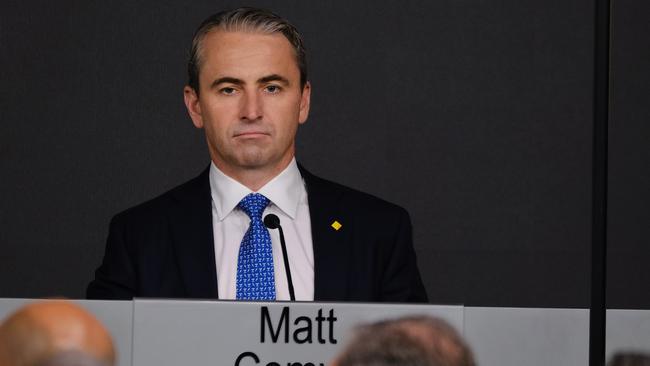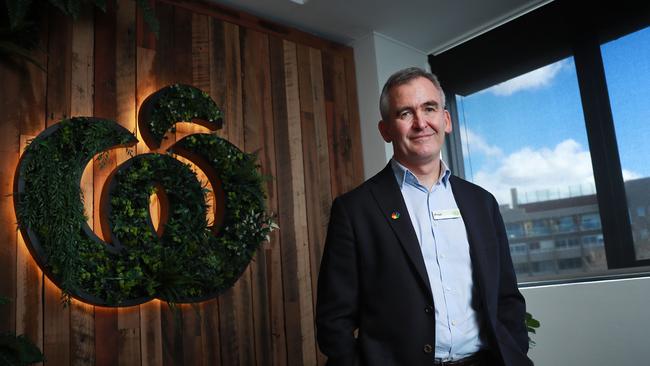Interest rate rises threaten hit to consumer demand: CBA boss Matt Comyn
Commonwealth Bank chief Matt Comyn is wary of when the successive rate rises will start to dent consumer demand.

Commonwealth Bank chief Matt Comyn says businesses are closely assessing when 10 successive rate hikes will start to dent consumer demand and cool inflation, as he warned a slump in building approvals risked a stark housing shortage in 2024-25.
Speaking at a business event in Sydney, Mr Comyn said conditions across many parts of the business sector, including entertainment, hospitality and travel, were very robust. But the key issue for business was how a slowing economy and rising rates would weigh on demand.
The CBA boss said the construction sector still confronted challenges, although some players faced the prospect of a better 2023 when compared to the supply chain, pricing and labour supply issues they grappled with last year.
He cautioned retailers were seeing a “slight softening” in demand and said the bank was closely monitoring conditions from here.
“The question is going to be to what extent trading conditions start to slow over the period,” Mr Comyn said.
“The number one issue now is how does the rate cycle pass through into consumer demand.
“The cost of everything including banking is going to be on people’s minds this year.”
Inflation fighting is top of mind for the Reserve Bank as it seeks to rein in price pressures throughout the economy. As it delivered its 10th straight rate hike, the central bank on Tuesday flagged monthly consumer price indicators suggested inflation had peaked, even though services price inflation remained high and rents were rising at a fast clip.
“The central forecast is for inflation to decline this year and next, to be around 3 per cent in mid-2025. Medium-term inflation expectations remain well anchored, and it is important that this remains the case,” the RBA said.

Woolworths chief executive Brad Banducci said in aggregate food inflation had declined, but it had occurred “much more slowly” than anticipated.
“We are seeing a positive trend line but it’s taking longer than any of us would like,” he added. “Vegetables, which are unbelievably important for families, are now deflationary for us. You’re starting to see some easing of inflation on red meat in particular, unfortunately we’ve seen the opposite happen with poultry.”
“We underestimate how long it takes for things to flow through the value chain. There are some areas that are still stubbornly inflated and those are the ones we are worried about.”
Among those areas, Mr Banducci said were baby, dairy and bread products. He also highlighted that freight rates in Asia had almost returned to pre-pandemic levels.
Mr Comyn highlighted a sharp jump in rents across many markets as a concern for some households, particularly with rents climbing 17 per cent in Sydney units over the last 12 months.
“It’s still challenging for many people,” he said.
Mr Comyn also cautioned of potential housing supply shortages in Australia 2024-25 as building and development approvals eased.
“Look at the level of approvals in the pipeline, particularly I think into more affordable housing,” he said.
More broadly, Mr Comyn noted many borrowers had prepared for higher rates and said hardship requests remained 20 per cent to 25 per cent below pre-pandemic levels.
Asked whether he expected banks to be in the firing line from borrowers and politicians as rates continued to rise, Mr Comyn said: “We do, and we do so in so far as it’s going to be a period of lower economic growth.”
He noted Australia needed strongly capitalised and profitable financial institutions that were able to navigate downturns, an experience that was evident during the global financial crisis.
Mr Comyn also acknowledged the federal government would need to make “tough choice” over the medium term as it rebuilt its fiscal buffers.
On competition in deposit pricing, Mr Comyn said it was “a consideration” for CBA as the competition regulator prepared to probe the market.
He highlighted positive anecdotal feedback from CBA business customers, with many reporting the “best trading conditions” they’d seen. That included strong forward bookings in the travel sector.
“We would expect in any period of time we’ll be scrutinised for our decisions,” he added.
Separately, Macquarie Group CEO Shemara Wikramanayake highlighted the bank was still a small player in the local banking market with about 5 per cent share of mortgages and an even smaller share of the business banking market.
“We are not chasing growth for growth’s sake,” she said, as she outlined Macquarie’s investment in technology in its banking and financial services division continued to rise.
“You can never sit on your laurels. We need to keep moving.”
Ms Wikramanayake declined to comment on the RBA’s latest rate rise or speculation that Macquarie’s asset management unit was pursuing separate bids for Telecom Italia and London-listed investment manager M&G.






To join the conversation, please log in. Don't have an account? Register
Join the conversation, you are commenting as Logout